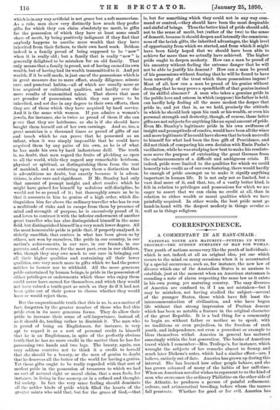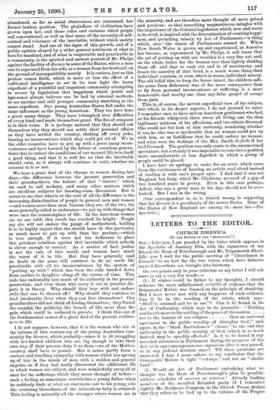CORRESPONDEN CE.
A COMMENTARY IN AN EASY-CHAIR:
NATIONAL YOUTH AND MATURITY-PUTTING UP WITH TROUBLE-THE SUDDEN SYMPATHY OF MAN FOR WOMAN. THE youth of nations seems very like the youth of individuals : which is not, indeed, at all an original idea, yet one which recurs to the mind on many occasions when it is accentuated by a special occurrence, such as, for instance, the new law of divorce which one of the Australian States is so anxious to establish, just at the moment when an American statesman is sounding a note of alarm respecting the same law as it exists in his own young, yet maturing country. The easy divorces of America are confined to, if I am not mistaken—but I may be mistaken, not having studied the subject—several of the younger States, those which have felt least the intercommunication of civilisation, and who have begun life without that strong impression of Puritan descent which has been so notable a feature in the original character of the great Republic. It is a bad thing for a community to begin so, without father or mother so to speak, with no traditions or even prejudices, in the freedom of rank youth, and independence, not even a precedent or example to bless themselves withal. America in general has matured amazingly within the last generation. The books of American travel which I remember—Mrs. Trollope's, for instance, which wrought the subjects of her remarks almost to frenzy, and much later Dickens's notes, which had a similar effect—are, I believe, entirely out of date. America has grown up during this interval. She has learned how other people behave, and she has grown ashamed of many of the habits of her calf-time. When an American novelist wishes to represent to us the kind of man who overcomes the ordinary Philistine on the other side of the Atlantic, he produces a person of painful refinement, culture, and aristocratical breeding, before whom the masses fall prostrate. Whether for good or for evil, America has
abandoned, so far as social observances are concerned, her former lawless position. The prejudices of civilisation have grown upon her, and those rules and customs which people call conventional, as well as that sense of the necessity of self- control and tolerance of the inevitable, without which society cannot stand. And one of the signs of this growth, and of a public opinion shaped by a wider general sentiment of what is best for mankind, and of what is respectable and practicable in a community, is the spirited and earnest protest of Mr. Phelps against the facility of divorce in some of the States, where a man can be separated from his wife, or a woman from her husband, on the ground of incompatibility merely. It is curious, just as this protest comes forth, which is more or less the effort of a cultivated intelligence to set in its true light the hasty expedient of a youthful and impatient community attempting to secure by legislation that happiness which youth and ignorance always believes can be had by external methods, to see another and still younger community snatching at the
same expedient. Our young Australian States fall under the same influences as the young American. They too have done a great many things. They have triumphed over difficulties of every kind, and made themselves great. The fire of conquest is in their veins. It is perhaps natural that they should ask themselves why they should not settle their personal affairs as they have settled the country, shaking off every yoke, bearing no inconvenience which they could get rid of. We in the older countries have to put tip with a great many incon- veniences and have learned by the labour of countless genera- tions that to endure the conditions of our natural life is in itself a good thing, and that it is well for us that the inevitable should exist, as it always will continue to exist, whether we consent to it or not.
We hear a great deal of the change in women during late days,—the difference between the present generation and their grandmothers, the failure of that " reserve " which we used to call modesty, and many other matters which are excellent subjects for drawing-room discussion. But it seems to me that what is at the root of all the difference is the increasing disinclination of people in general, men and women —and women more than men, because they are, of the two, the more generally called to endurance—to put up with things that were once the commonplace of life. In the American woman (as we are told) this revolt has reached its height. People say she will not endure the pangs of motherhood, holding it to be highly unjust that she should have in this particular so much more to put up with than her partner,—which is true enough, if it were not too ludicrous to place this petulant rebellion against that inevitable which nobody is clever enough to correct. As a matter of fact, justice is not the rule of this world, and women have much the worst of it in life. But they have generally (and no doubt in the mass will continue to do so) made life practicable with all its inconveniences, by the system of "putting up with" which has been the code banded down from mother to daughter along all the course of time. This code has undeniably lost much of its authority in the present generation; and even those who carry it out in practice dis- pute it in theory. Why should they bear with and endure evils that can be thrown off ? Why should they continue to lead intolerable lives when they can free themselves ? Our grandmothers did not think of freeing themselves ; they feared the scandal, the publicity, the breach of life, more than the pain which could be endured in private. I think this one of the fundamental causes of a great deal of the present restless- tans in life.
I do not suppose, however, that it is the women who are at the bottom of this curious cry of the young Australian com- munity for divorce, which probably—since it is ill struggling with hot-headed children who are big enough to take their • own way, if their parents deny it to them—we of the Mother. .countryshall have to permit. But it arises partly from a curious and touching sympathy with women which has sprung up of late in the minds of men, with a sudden and general impulse, as if they had newly discovered the additional ills to which women are subject, and were wonderfully sorry all at once for the sufferings which they never thought of before— such a feeling as sometimes overwhelms a young father when he suddenly finds at what an enormous cost to his young wife the crowning blessedness of the miraculous baby is attained. This feeling is naturally all the stronger where women are in the minority, and are therefore more thought of, more prized and precious : so that something magnanimous mingles with the impatience of the Colonial legislation which, new and warm to its work, is inspired with the determination of creating happi- ness, and quenching misery, by Act of Parliament,—a thing which, alas ! the wisest of Parliaments cannot do. When New South Wales is grown up and experienced, as America has become, as represented by Mr. Phelps, it will learn that the art of putting up with our troubles is a very fine art, and, on the whole, better for the human race than lightly shaking them off : and that to rush out and in of matrimony, and lessen the sanctity of that bond, is a much worse thing than individual vexation, or even, which is worse, individual misery. The old belief that to keep the house intact, the children safe, the name from dishonour, was of far more consequence than to fly from personal inconvenience or suffering, is a more honourable and worthy one than any false gospel of escape from pain.
This is, of course, the merest superficial view of the subject, into which, in its deeper aspects, I do not pretend to enter. I remember once to have met an American gentleman who had, as his friends whispered, three wives all living, one the then legitimate mistress of his affections, and two others divorced. One could not but look at him curiously, wondering whether it was he who was so intolerable that no woman could put up with him, or so fastidious that he could endure no woman, and what were the feelings of the Mrs. Smith de facto if her lord frowned. The position was only comic to the unconcerned spectators ; but certainly it was impossible to conceive a position more uncomfortable or less dignified in which a group of people could be placed.
1 have here an apology to make for an error, which arose from the carelessness of hearing an article read aloud instead of reading it with one's proper eyes. I find that it was not England, but Italy, which Mr. Gladstone accused of a gap of two hundred years in poetry. Even in this ease perhaps, Alfieri, who was a great man in his day, should not be over- looked. But I was in the wrong.
[Our correspondent is, as is hinted, wrong in supposing that lax divorce is a peculiarity of the newer States. Some of the States of New England are among the most lax.—En. Spectator.]



















































 Previous page
Previous page